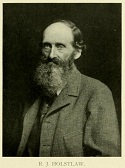
 Among
the best known and highly respected families of Marion county is found the
one bearing the name that forms the caption of this article. Richard J.
Holstlaw was born in this county on the 3d of April, 1837. He still lives on
the farm where he was born and during this span of life he has witnessed
most wonderful changes in the progress and development of the country.
Among
the best known and highly respected families of Marion county is found the
one bearing the name that forms the caption of this article. Richard J.
Holstlaw was born in this county on the 3d of April, 1837. He still lives on
the farm where he was born and during this span of life he has witnessed
most wonderful changes in the progress and development of the country.
Mr. Holstlaw is descended from those hardy pioneers that crossed the
mountains into Kentucky and Tennessee, blazing the way through the
wilderness, opening up for colonization and occupancy the rich hunting
grounds south of the Ohio. This tide of immigrants gradually worked its way
westward and northward, crossing the Ohio into Indiana and Illinois and
blending here with the settlers coming from Pennsylvania, New York and New
England.
Our subject's father, Daniel S. Holstlaw, was born near
Glasgow, Kentucky, in 1813, toward the close of the second war with England.
The treaty at the conclusion of this war stimulated the westward movement
and when Daniel was eight years old he came to Paoli, Indiana, with his
parents. His mother, Ruth (Middleton) Holstlaw, a native of Tennessee, was
the eleventh of fourteen children and came to Marion county, Illinois, in
1833. At the age of nineteen years, Daniel Holstlaw left the Hoosier state
and immigrated to Marion county, Illinois. Here he entered a claim and also
purchased some land, paying seven dollars per acre. At this time the country
was still in its primitive state, and the six children, of whom our subject
was the second, became quite familiar with early day methods of getting
along.
Among other things that Mr. Holstlaw relates are his school
experiences. The expense of paying for an instructor was met on the
subscription plan, and all the neighbors joined in to obtain the privilege
of a schooling for their children. Wild game of all kinds still abounded in
the forests and furnished part of the food for the settlers. One morning Mr.
Holstlaw counted thirty-seven deer - after a night when the prairie was on
fire, when they could be seen clearly - to say nothing of other game, so
abundant then, but so rarely seen now. When we reflect over to the fact that
such a span of years has witnessed so great a contrast between the present
conditions and those of that day, it seems almost a fiction. Yet one needs
but to ponder over the wonderful changes of the last decade to convince him
that we are even now already in the shadow of what will come tomorrow. While
now the traction engine pulls the series of breaking plows rapidly through
the sod, Mr. Holstlaw recalls the time when he followed the four yoke of
patient oxen that composedly drew through the virgin soil the hand-made plow
of hickory wood. Today the hay loader puts the sweet scented product of the
meadow on the wagon and at the driver's feet, while then the dogwood fork,
whittled by hand, was the only tool available. Fur and hides were hauled to
St. Louis, seventy-five miles away, and court was held in a log structure at
the county seat of Salem.
We shall now turn our attention to the
domestic relations of our subject. In 1863 he was joined in marriage to Mary
(Gagger) Barry. This union, though happy, was destined to be brief, for ere
long the young wife was called hence, followed soon after by her infant
child. On July 18, 1869, Mr. Holstlaw took as his second wife Rachel Barry,
this union resulting in the birth of the following children: Effie I., who
became the wife of Louis Barksdale; the son is Forrest D., the second
daughter of the family, Carrie A., has become the wife of Walter K. Shook.
In his political affiliations Mr. Holstlaw has adhered to the Democratic
party, and he is a devoted member of the Cumberland Presbyterian church. He
and his wife are well known in the entire community as exemplary and worthy
citizens.
Extracted 08 Jul 2017 by Norma Hass from 1909 Biographical and Reminiscent History of Richland, Clay and Marion Counties, Illinois, pages 160-161.